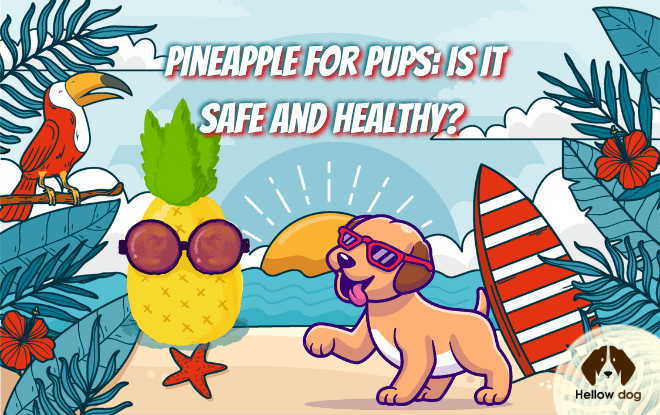As far as fruits are concerned, pineapple is a go-to choice for many human beings, as they are filled with minerals, vitamins, and fiber. However, have you ever wondered if pineapples are good for your dog?
The answer is yes, pineapples are safe enough to be consumed by dogs, as long as they are in moderation. Pet owners are constantly looking for ways to include healthy fruits in their dog’s diets.
So if you’re wondering about the ways in which you can feed pineapples to your dog, and what are the pros and cons to be aware of, we at petfoodbrands.net are here to assist you with all the crucial information.

What to Know About Feeding Pineapple to Your Dog
If your dog is eating pineapples, it’s best to consume them in a raw form.
Even though canned pineapple is not exactly toxic for puppies, it’s not wise to choose it as a snack for them, mainly because they come in a syrupy form that is filled with high levels of sugar.
When a dog eats such sugary pineapple, it can upset their tummy. Also make sure that you get rid of the steam, core, skin, and leaves of pineapple before serving it to your doggy.
Not only do these parts serve as choking hazards, but they also pose risks of intestinal blockage. If your dog accidentally swallows a pineapple’s core, get in touch with your vet immediately.
For anyone who is planning to dehydrate a pineapple themselves, dried pineapples can come as an easy and safe option for your dog. Ensure that it’s not extremely hard because your dog could choke on it. By drying the pineapple, you can also concentrate its sugar content.
The dried pineapple available in stores is way too high on sugar and can lead to vomiting, diarrhea, and an upset stomach for your pet. They are also loaded with preservatives which could pose a threat to your dog’s health.
Cooked pineapple is not bad for dogs, but dog owners need to ensure that it doesn’t contain other ingredients such as onion and garlic, as both these ingredients are harmful to dogs.
If they take a small bite, it can upset their digestive system, but in huge quantities, it can lead to bigger problems. Make sure that the cooked pineapple isn’t too hot, or else it could burn your little dog’s mouth.
Since pineapples are treats and not the main item of your dog’s healthy diet, they should make up only 10% of what they consume throughout.
While larger dogs can have some pieces of pineapple, you should be extra careful when dealing with smaller dogs. If your dog weighs 20 lbs. or less, give them just a piece or two, and keep about three pieces for the ones weighing between 21 lbs. to 30 lbs.
Medium-sized dogs can have about five to six pieces.
Benefits of Pineapples for Dogs
Pineapples can bring about numerous benefits for dogs. The positive aspects to know about pineapples are as follows:
Filled with Nutrients
The immunity of a dog can increase by eating pineapples as they are packed with fructose, fiber, vitamins, and minerals. These vitamins fill your pets up with energy and the overall nutritional value of pineapples is good for a dog’s health.
Aids with Digestion
The proteins consumed by a dog are always vital to be monitored. Pineapples contain bromelain, which is a protein-digesting enzyme that helps in maintaining a dog’s digestive system and enables them to take in all the imperative nutrients from their diet.
Might Cure Coprophagy
Dogs can often suffer from coprophagy, which is a behavioral disorder wherein dogs eat their own feces. One of the reasons behind this could be the fact that their digestive system is weak.
With the nutrients not being absorbed properly and getting excreted from their bodies, they attempt to compensate for the lack of nutrients through this behavior. By feeding them pineapples, their digestion gets better, thereby leading them to excrete everything properly.
Therefore, pineapples can help in curing coprophagy in dogs.
Prevents Cancer
The bromelain present in pineapples can help in preventing cancer. They control the swelling of joints and can also help in shrinking tumors. Additionally, they can abate the pain caused due to chemotherapy.
Controls Inflammation
When a dog gets hurt, the area not only begins to swell, but it can also cause further damage, leading to arthritis. Pineapples have anti-inflammatory properties that can reduce swelling among dogs in such cases.

Disadvantages of Pineapples for Pups
With the advantages of pineapples having been laid about, it’s time to explore the cons as well. Here are a couple of the risks associated with pineapples for dogs:
Can Cause Allergies
Once you have introduced your dog to pineapples, be sure to monitor their health because they could display allergic reactions. Therefore, be cautious when you treat them to pineapples initially. The symptoms to watch out for include swelling, itchiness, and difficulty in breathing.
Upset Stomach
Be sure to keep your dog away from consuming the skin of a pineapple, its core, or its crown. These parts are not easy for a dog to chew on, and could lead to them choking on it.
Although digestive benefits are indeed a part of eating pineapples, it should all be done in moderation, because if a dog ends up consuming too much pineapple, it can cause constipation or lead to an upset stomach.
Even though it’s not that huge a possibility, the chances of it happening aren’t nil. The fiber in a pineapple soaks up the water, and the presence of an excess of fiber causes the hardening of a dog’s stool since they don’t receive enough water in such situations.
Pancreatitis
Certain food items pose a health risk for dogs wherein they gain a lot of weight, and examples of such items include pineapples and tropical fruits. The extremely high sugar content present in pineapples stays back in a dog’s body in the form of fat.
With time, this can make your dog obese, which can affect their joints and lead to pancreatitis, which is a condition in which their pancreas gets inflamed. This is a life-threatening condition that should be taken seriously.
Teeth Decay
As mentioned earlier, pineapples contain plenty of sugar, and if your dog consumes pineapples frequently, it can eventually lead to tooth decay. This gets worse if their teeth aren’t brushed consistently.
In fact, the presence of such vast quantities of sugar can also amplify gastric issues and also cause vomiting in some cases.
Conclusion
Now that you know the advantages and disadvantages of pineapples as a food item for dogs, you can decide accordingly and feed it to your doggo in small quantities so that they can derive the necessary goodness out of it.
Do consult your veterinarian before incorporating any new element into your dog’s meals, and go through the information mentioned above for a deeper insight into the overall value of pineapples for your canine buddy.
FAQ’s:
Q: Is pineapple safe for dogs to eat?
A: Yes, pineapple is generally considered safe for dogs in moderation. It is a good source of vitamin C, fiber, and other nutrients that can benefit your pet’s health.
Q: Can pineapple be harmful to dogs?
A: While pineapple is generally safe for dogs, it can cause digestive issues in some pets. Pineapple is high in fiber, which can cause diarrhea or other gastrointestinal problems if your dog eats too much.
Q: How should I feed pineapple to my dog?
A: Pineapple should be fed to dogs in moderation, as a treat or snack. You can offer small pieces of fresh or canned pineapple, but be sure to remove the skin and core, as these parts can be difficult for dogs to digest.
Q: Can pineapple help with my dog’s digestion?
A: Yes, pineapple contains enzymes that can aid in digestion and help to break down proteins. It may also help to reduce inflammation in the digestive tract.
Q: Can pineapple help freshen my dog’s breath?
A: Yes, pineapple contains enzymes that can help to freshen your dog’s breath. However, it is important to remember that pineapple should only be fed in moderation, as too much can cause digestive issues.







